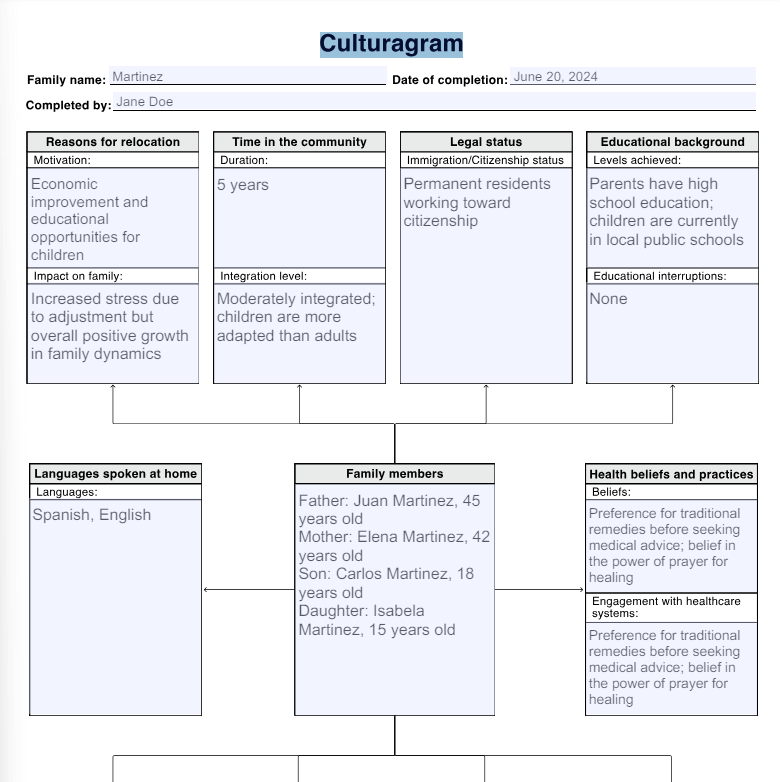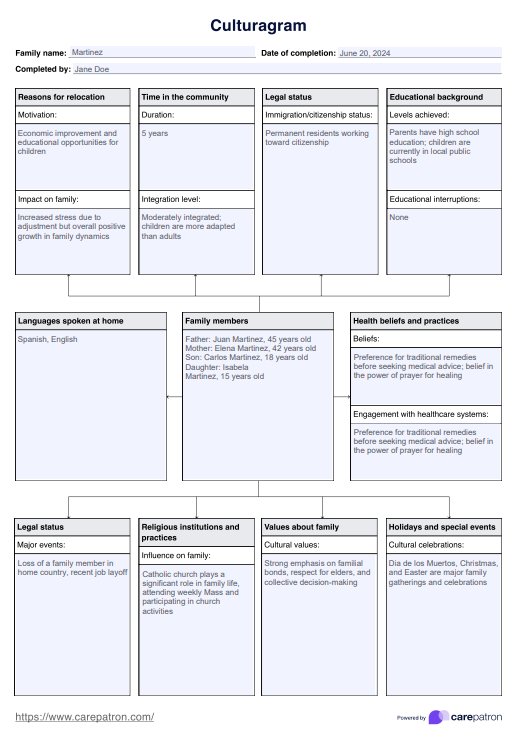Culturagram Template
Explore how our Culturagram Template can enhance your understanding of culturally diverse families. Ideal for social workers and healthcare providers, this tool gathers crucial cultural insights to inform more personalized care.


What is a culturagram?
A culturagram is a family assessment tool designed to help professionals, especially social workers and healthcare providers, understand and address the cultural needs of increasingly diverse family systems. It captures essential information about a family's culture, including values, beliefs, and experiences that influence their interactions with healthcare, educational, and social services.
Which professionals use this and for what?
Culturagrams are primarily used by social workers, therapists, and healthcare professionals. They are utilized to individualize care and support for immigrant families, culturally diverse families, and others, navigating the complexities of maintaining their cultural identity while integrating into a new societal context. These tools are crucial in building culturally competent practices that respect and incorporate an individual's cultural background.
What specific information does it gather?
A culturagram systematically gathers detailed information across ten critical areas to comprehensively view a family's cultural background and current situation. This data is crucial for professionals working with culturally diverse families to offer tailored and effective support. Here’s what the culturagram specifically examines:
- Reasons for relocation: Investigate the motives behind a family's migration, including seeking better economic opportunities, escaping conflicts or safety concerns, or reuniting with other family members. This understanding helps contextualize their current challenges and aspirations.
- Time in the community: Assesses how long the family has resided in their current location and gauges their degree of social and cultural integration. This can influence their access to community resources and social support systems.
- Legal status: This section details the family's immigration or citizenship status, highlighting potential legal challenges that might impact their stability or access to services such as healthcare and education.
- Educational background: This section captures the educational levels within the family and notes any disruptions due to migration. This can affect employment opportunities and social mobility.
- Language spoken at home: This section identifies the primary languages spoken within the family unit, offering insights into possible communication barriers affecting interactions with schools, workplaces, and healthcare providers.
- Health beliefs and practices: This section explores the family’s cultural beliefs about health and medical treatments, which can significantly influence their engagement with healthcare systems and acceptance of medical interventions.
- Crisis events: Documents significant life events or traumas the family has experienced and notes cultural methods of coping or crisis management. Understanding these responses is vital for providing culturally sensitive support during challenging times.
- Religious institutions and practices: This course examines the role of religion in family life and decision-making processes, which can have a major influence on values and behaviors.
- Values about family: This course investigates core cultural values regarding family dynamics, including the roles of elders, child-rearing practices, and expectations of gender roles. These values are crucial for personal interactions and understanding family structure.
- Holidays and special events: Highlights important cultural and religious celebrations significant to the family, offering opportunities to connect with their heritage and maintain cultural identity.
By gathering this specific information about cross-cultural practice, a culturegram allows professionals to better understand and address the unique needs of increasingly culturally diverse families, ensuring a more individualized and culturally competent practice.
Culturagram Template
Culturagram Template Example
How to use our Culturagram Template
Download our printable Culturagram Template to effectively engage and understand cultural differences in culturally diverse families. This tool is structured to help professionals methodically gather, analyze, and apply cultural information in their practice. Here's how to utilize the Culturagram Template efficiently:
- Gather information: Employ the template to collect data meticulously during interviews with family members. Focus on the ten critical areas outlined to capture a comprehensive cultural profile, including reasons for relocation, legal status, health beliefs, and more.
- Analyze and interpret: Examine the collected information to grasp how cultural factors influence the family’s health, educational access, and overall welfare. This step is crucial for identifying specific needs that may be culturally rooted.
- Implement changes: Use the insights gained from the analysis to customize interventions, support services, and care plans. Ensure these modifications respect and actively incorporate the family’s cultural values and norms. This tailored approach improves service delivery and empowers the family within their cultural context.
Professionals can enhance their cultural competence and clinical skills by following these steps with our Culturagram Template, leading to more effective and empathetic interactions with culturally diverse families.
Benefits of using a culturagram
Using a culturagram offers several significant benefits that enhance the effectiveness of social work and healthcare interventions for culturally diverse families. Here’s an expanded view of the advantages:
Enhanced cultural competence
Utilizing a culturagram deepens professionals' understanding of a family's cultural context, encompassing their values, traditions, and social norms. This comprehensive awareness fosters more informed, culturally sensitive interactions, which is essential in an increasingly diverse society. By grasping the nuances of different cultural backgrounds and religious institutions and practices, professionals can avoid cultural misunderstandings and provide support that respects each family's unique cultural identity.
Improved client relationships
A culturagram helps build trust and rapport by demonstrating genuine respect and consideration for the client's cultural background. When clients and families see their cultural identities are recognized and valued, they are more likely to engage openly and honestly with service providers. This trust is crucial for effective communication and collaboration, which are the foundations of successful therapeutic and support relationships.
Targeted interventions
With a clearer understanding of a family’s cultural influences, professionals can design interventions more aligned with the family's specific cultural practices and needs. This tailored approach ensures that strategies and solutions are culturally appropriate and more likely to be embraced and implemented by the family. For instance, understanding a family's health beliefs and practices can lead to more personalized healthcare plans that accommodate traditional remedies alongside conventional treatments.
Empowerment of culturally diverse families
The culturagram empowers families by involving them actively in the assessment and planning processes. This empowerment promotes autonomy and self-efficacy among parents and family members, encouraging them to actively manage their health, education, and welfare based on their cultural strengths and resources.
Facilitates multidisciplinary collaboration
When used in multidisciplinary teams, a culturagram provides a shared tool for understanding cultural differences, enhancing coordination among practitioners such as doctors, social workers, and educators. This coordination is crucial when addressing complex cases of trauma that involve multiple aspects of a family’s life, ensuring that all interventions are coherent and culturally congruent.
Prevention of cultural oversights
By systematically evaluating cultural factors, the culturagram prevents oversights that could lead to marginalization or discrimination against immigrants and culturally diverse families. It ensures that all family members, regardless of their cultural or immigrant status, are considered in a manner that respects their cultural norms and legal circumstances.
Incorporating a culturagram into family assessments leads to more effective practice, improved outcomes, and enhanced client and professional satisfaction. It becomes an essential tool in navigating the complexities of cultural diversity within modern social and healthcare environments.
How is this different from eco-maps and genograms?
While eco-maps and genograms focus on family relationships and social connections, culturagrams delve into cultural dimensions that influence a family’s functioning within their community and broader society. They address elements like immigration, cultural beliefs about health, and the role of religion, providing a more rounded view of a family's cultural background.
Commonly asked questions
It’s recommended that a culturagram be updated annually or with any significant change in the family’s situation.
Culturagrams are useful for any family with distinct cultural traits that influence their interactions with societal structures.
Yes, many social work and healthcare programs offer training on how to use culturagrams and other cultural assessment tools effectively in practice.

.jpg)























-template.jpg)













































































